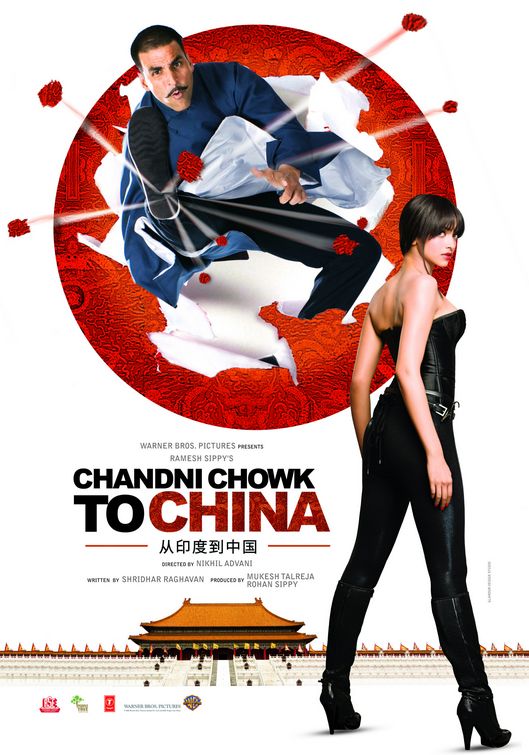“Hindu Action Comedy”

| None | Light | Moderate | Heavy | |
|---|---|---|---|---|
| Language | ||||
| Violence | ||||
| Sex | ||||
| Nudity |
What You Need To Know:
CHANDNI CHOWK TO CHINA starts off as a slapstick comedy, then becomes a more serious martial arts drama. It clearly shows the clever way many Indian movies have in blending comedy, musical numbers, action, and drama to hold the viewer’s interest. Regrettably, there are many references to Hindu worship and other pagan beliefs. The hero not only worships the potato image of his god, but all the characters believe in reincarnation. Eventually, the hero believes that his god helps those who help themselves.
Content:
(PaPaPa, FRFRFR, O, B, Ro, L, VV, N, AA, MM) Very strong, slightly mixed pagan worldview with very strong false religion and some occult references in which hero worships the false Hindu god Ganesh, people believe in reincarnation, hero tries to learn his destiny from Tarot cards and astrology in two scenes, and there are some images of Buddha, but hero concludes that “God helps those who help themselves” and that self-reliance is the answer to his problems, plus minor moral elements in the context of battling an evil, cruel oppressor and some Romantic elements about following one’s dreams; two or three obscenities and six light profanities (though in a Hindu/Buddhist context); strong action violence with some slapstick violence such as man’s father kicks him in the rear and he goes flying, lots of martial arts training and fighting, punching and kicking, man stabbed, two men fall from the Great Wall of China, man pierced by chopsticks and dies, and two implied beheadings with some blood shown on neck before bodies fall; no sex but some comments about beautiful women; upper male nudity and some female cleavage; drinking and drunkenness; no smoking or drugs; and, diamond smuggling, lying, woman cheats man out of his place in line, and hero sees a likeness of his Hindu god in a potato.
More Detail:
The movie begins in the Chandni Chowk market district of Delhi, India. Sidhu is a grown-up Indian man who chops potatoes and vegetables at his adoptive father’s restaurant. Sidhu dreams of greatness, however. This earns him frequent kicks in the pants from his father, which sends Sidhu flying high through the air. When Sidhu finds the form of his elephant-headed Hindu god, Lord Ganesh, in a potato, his father gives him another kick in the pants.
A group of Chinese villagers oppressed by a vicious gangster named Hojo comes to India to look for the reincarnation of a legendary warrior. They believe Sidhu is that man and want him to kill Hojo. Sidhu cannot speak Chinese, however, so his mystical friend Chopstick, who translates for him, neglects to tell him about Hojo. Chopstick is afraid Sidhu won’t go with him to China if he knows about Hojo.
Sidhu’s father reluctantly gives Sidhu permission to find his destiny in China, but promises to visit. At the airport, Sidhu spies his favorite model, Sakhi, whose stage name is Miss TSM. She cheats him out of his place in line, however.
In China, Sidhu and Chopstick party with the villagers, while Sakhi searches for her lost sister, Susie, who was lost when Hojo killed her father when they were babies. A drunken Sidhu unknowingly dispatches a group of ninjas sent by Hojo, like something out of Jackie Chan’s DRUNKEN MASTER movies. Also, Sakhi finds out that her sister is working for Hojo.
Sidhu’s father shows up at the same time that Hojo arrives at the village to kill Sidhu, the reincarnated warrior. Hojo realizes, however, that Sidhu is a fool. He humiliates Sidhu in front of the villagers and kills his father, who has come to visit.
Sidhu vows revenge, but who will teach him enough kung fu to kill Hojo? And, can Sakhi reform her sister Susie?
CHANDNI CHOWK TO CHINA starts off as a silly slapstick comedy, then becomes a more serious martial arts melodrama as the hero confronts the evil Hojo. It clearly shows the clever way many movies from India have in blending comedy, musical numbers, action, and serious drama to hold the viewer’s interest. Some of the broad comedy, however, doesn’t match the tone of the rest of the movie.
Regrettably, there are many references to Hindu worship and other pagan beliefs in the movie. The hero not only worships the potato image of his god, but all the characters believe in reincarnation. There are also some statues of Buddha in the movie. Eventually, the hero decides that God helps those who help themselves, which is another false religious notion.
Hinduism is a false religion that preaches belief in many gods, behind which there exists a Supreme Reality or Divine Ground of creation or being that is transpersonal, personal or impersonal, depending on one’s school of thought. In some ways, Hinduism is henotheistic, in that many Hindus pick one god to devote more worship to than others. In other ways, it harkens back to a primitive monotheism where Brahma is the supreme god who created the universe. The goal, however, is to become one with the Supreme Reality thus losing one’s identity, whereas, in Christianity, the believer enjoys communion and fellowship with God, who forgives, sanctifies and purifies the believer of his or her sin so the believer becomes the best he or she can be. As in this movie, the focus in Hinduism is on human effort to achieve inner peace and ultimate success, not on God’s grace through faith in Jesus Christ.


 - Content:
- Content: 

